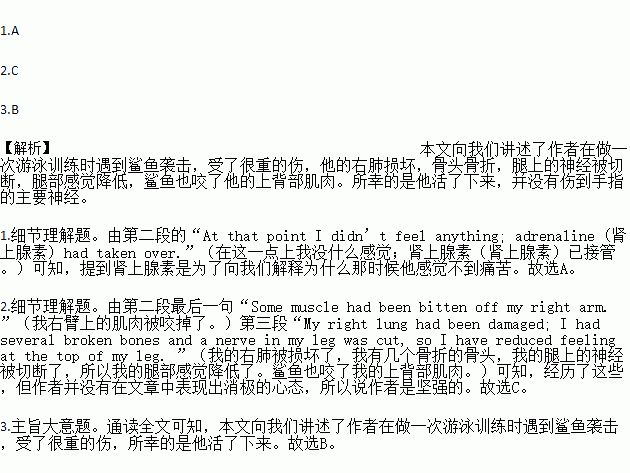题目内容
On 29 May last year, I was doing my swim training for a half Ironman race in the bay near my home.
I was finishing my first loop (圈) when I felt jaws coming around my body and a sharp pain. The water was dark, so I couldn’t see anything. It just came out of nowhere and then it was gone in a flash. I knew it was something really big and assumed it was a shark. I panicked, but knew I needed to get out of the water. I was kicking wildly in case it came back. There was a lifeguard boat close by, so I waved my arms in the air and screamed for help. It got to me within 20 seconds. At that point I didn’t feel anything; adrenaline (肾上腺素) had taken over. The lifeguards held me under the arms and pulled me up out of the water. Then the pain kicked in and it was pretty hard to bear. Some muscle had been bitten off my right arm. I felt a lot of warm, gushing blood.
My chest felt heavy, as if someone had put their foot on it, and I was having trouble breathing. It was extremely painful. When I got to the hospital, I told the nurses to put me to sleep because of the pain. I just wanted them to fix me.
I woke up after surgery four hours later. My doctor was amazed when I managed to move my fingers: the bite just missed a major nerve. My right lung had been damaged; I had several broken bones and a nerve in my leg was cut, so I have reduced feeling at the top of my leg. The shark also bit through my upper back muscle.
Local experts determined that the shark was probably 9-10 feet long. It was young, about seven years old. It just attacked me, left and didn’t come back because it figured I wasn’t food.
1.The writer mentions Adrenaline in Paragraph 2 to ________.
A. explain why she didn’t feel pain at that time
B. offer a possible reason the shark attacked her
C. show how dangerous the situation was then
D. describe the suffering a shark bite could cause
2.The writer of the text can be best described as ________.
A. grateful B. confident
C. tough D. aggressive
3.Which of the following might be the best title for the text?
A. A Shark from Nowhere
B. Surviving a Shark Attack
C. A Race against Time
D. No Panic over Sharks at Sea
 阅读快车系列答案
阅读快车系列答案
